AVL To Accelerate The Vision Of Smart And Connected Mobility: Urs Gerspach
- By Sharad P Matade
- June 22, 2021

AVL is the world’s largest independent company for development, simulation and testing in the automotive industry and in other sectors. As a global technology leader, AVL provides concepts, solutions and methodologies in the fields of e-mobility ADAS and autonomous driving, vehicle integration, digitalisation, virtualisation, big data and much more.
In an interview with Sharad P Matade, Urs Gerspach, Executive Vice President of Test Systems and Global Operations, Instrumentation and Test Systems at AVL, shares his thoughts on the growth enablers and the company’s capabilities to cater to a wide range of demand in the automotive testing business.
 What is the impact of the Covid pandemic on AVL’s testing business?
What is the impact of the Covid pandemic on AVL’s testing business?
There is an impact, no doubt about it. The effect was much stronger last year; the customers constantly postponed their decisions about the orders of lab projects. However, this year, we are seeing a sudden improvement in the situation. In the first quarter of this year, we received massive orders of over 180 test systems for battery test labs. The situation is improving very fast, and the investments are being released by the OEMs. Until last year, the trends were not clear. Now we see a fast and strong growth of the passenger car industry towards electrification business. We are also witnessing the growing focus on fuel cells in the commercial truck segment. AVL is very well on track regarding its turnover and our margins for this year.
What is the reason for the increased demand of battery test labs?
In the past, many OEMs bought their battery cells from cell manufacturers like Panasonic, LG, CATL etc. and used these third party cells to build their own batteries. Several passenger car OEMs changed their strategy and decided to develop their own battery cells. Increased range, reduced charging time and lower costs are important key factors to convince customers to buy electric cars. Not just the development of the battery, but the combination of Battery, Inverter, E-Motor and Charging Infrastructure is important to develop a successful electric car. For this development, you need new test equipment such as battery cell cyclers, conditioning systems, climate chambers, automation and lab management software. The entire car is tested on High Voltage Powertrain Test Beds and Chassis Dynos where AVL has been the market leader for many years.
 Europe is gearing up for Euro-7. What is it? How will it influence the testing business?
Europe is gearing up for Euro-7. What is it? How will it influence the testing business?
EU-7 will set stricter limits for CO2 and particle emissions. We expect PM10 (particulate matter with a size of 10 μm) will be introduced for Euro-7 and we have therefore developed measurement systems which can measure PM10.
It is also important to measure the CO2 emissions of combustion engines as precisely as possible. It is not just about compliance with environmental standards, but also about fuel consumption. We also deliver Portable Emission Measurement (PEM) systems for measuring emissions in real-time conditions on the street. While driving the car under real conditions, you might not execute a certified test run under predefined environmental conditions, therefore, other emissions will occur that need to be measured and analysed. AVL offers a wide range of in-vehicle measurement systems and software to determine what is actually coming out of the exhaust - in real driving conditions.
But there will also be a focus on non-exhaust emissions, particularly brake dust. Electric vehicles don’t emit exhaust emissions, but there is still brake and tyre dust. We have developed entire test systems to test real brakes under real-time conditions.
What would be the significant growth drivers in the traditional combustion engine business for AVL testing divisions?
As mentioned, the Euro-7 regulation will be one of the main drivers for AVL in the future. Besides all the other technologies like ADAS, every engine will be partly electrified either as a pure Hybrid, Plug In- or mild Hybrid. The technology of an Integrated Combustion Engine (ICE) can also be used to run with pure hydrogen. AVL is developing several engines for various customers that convert existing ICE technologies in new concepts.
We are also working on measurement technologies for synthetic fuel. AVL is working closely with Formula One teams as they will soon run their engines with synthetic fuels.
AVL has played a significant role in the development of the diesel engine in Europe. However, many OEMs are talking about discontinuing diesel engine vehicles in the near future. Do you see this as a challenge?
This trend will not have a great impact on our testing division. It will have a larger influence on the powertrain development division for diesel engines. If you take a look at the share of electrified cars in Europe - especially in Germany - they only account for 10 percent of the total vehicles; the remaining share of cars are still powered by combustion engines.
The combustion engine will still remain relevant for a while. However, increasingly in the form of a hybrid powertrain. AVL is therefore converting existing test beds for the car manufacturers so that they can be used to test hybrid vehicles. There are several customers who request pure electrical test benches. Some of our customers come to us with the requirement to completely convert existing combustion engine test fields to electrification test systems.
 Between electric vehicles and hybrid vehicles, which one holds more promise in India in the near term and the long term?
Between electric vehicles and hybrid vehicles, which one holds more promise in India in the near term and the long term?
I believe, in countries where the electricity network is not yet fully developed, hybrid cars will provide more flexibility, combining the possibility to run with fuel for an overland trip and electrified within the city.
In India, two-wheelers might have a faster increase in electrification similar to the development in China. ICE engines might keep dominating for a while, especially for the commercial vehicle. The introduction of pure battery electric vehicles mainly depends on how fast India is able to provide the necessary high-voltage charging infrastructure.
What about the AVL Tech Centre in India?
Our Tech Centre in India is one of our strongest Competence Centre for turnkey projects. AVL India is a very strong and reliable partner when it comes to planning of entire test fields including plant facilities. In the field of Powertrain Development, our India Tech Centre focuses on all three technologies – ICE, electrification and hybridisation – equally in all segments. AVL is an engineering company assisting customers with all types of mobility technologies. We recently got one of the first orders for fuel cell test systems from an Indian customer. So there is something exciting happening in our Tech Centre in India.
 What about the revenues? How much does your testing division contribute to the whole company?
What about the revenues? How much does your testing division contribute to the whole company?
In 2020, the company generated a turnover of EUR 1.7 billion, of which 12 percent was invested in R&D activities. The testing division contributes with around 50 percent of the turnover.
What are the challenges in the business?
One of the biggest challenges is definitely to cover the growing bandwidth of technologies. A couple of years ago, we were only talking about ICE vehicles. Today, we are talking about ICE vehicles, hybrid vehicles, electric vehicles, batteries, ADAS and autonomous driving, digitalisation, cybersecurity and big data. AVL has built comprehensive competences to accelerate the vision of smart and connected mobility.
If you are an engineer, you have a wide range of technologies to specialise in. So one of the challenges is to find the right engineers to work on these different technologies.
What is the latest on safety by AVL?
One of the issues that is yet to gain the industry’s attention is fire safety in electric vehicles. AVL has been associated with fire marshals in Europe. Fire brigades realised an increase in accidents with Battery Electric Vehicles (BEV). Not only accidents but also burning BEVs in parking garages are a big challenge. These vehicles are very difficult to extinguish due to the chemistry of the lithium-ion battery.
AVL has developed a firefighting system which can extinguish a lithium-ion battery fire on the testbed or for fire brigade usage. It is a unique patented system that runs on liquids such as water or gases like nitrogen to extinguish battery fires. We conducted a couple of test series with hybrid batteries. A burning battery with 18 metres of flame height and temperatures of up to 1,500 degrees Celsius could be extinguished in one minute. (MT)
- IAC India
- Lumax Group
- IAC Group
- Mahindra
- VECV
- Maruti Suzuki India
- Skoda
- Volkswagen
- Stellantis
- Sunil Koparkar
IAC India Bets On Engineering Depth & Diversification, Targets 20% CAGR Growth Till FY2030
- By Nilesh Wadhwa
- February 28, 2026

Sunil Koparkar, Managing Director, IAC India, outlines the company’s strategy to reduce customer concentration, expand exports and leverage group synergies following its integration with the Lumax Group.
As India’s automotive interior market evolves towards premiumisation, localisation and faster product cycles, IAC India, part of the Lumax Group, is repositioning itself beyond a single-customer dependency model – without diluting its core partnerships.
IAC India continues to derive a significant share of its revenue from Mahindra’s passenger vehicle business. While the concentration remains high, Koparkar is clear that diversification will be driven through growth rather than dilution.
“Mahindra will always be our primary customer. We have a very strong strategic partnership. But we are also working on expanding with other OEMs and in the commercial vehicle space. Our goal remains a 20 percent CAGR,” he says.
For FY2025, IAC India USD 140 million in revenue, and is targeting a 20 percent growth in FY2026. The company counts Mahindra as its primary customer with almost 78 percent of its business coming from them, while Maruti Suzuki India (12%), Volvo Eicher Commercial Vehicles (5%), Skoda-Volkswagen (3%) and Stellantis (1%) contribute towards the remaining business.
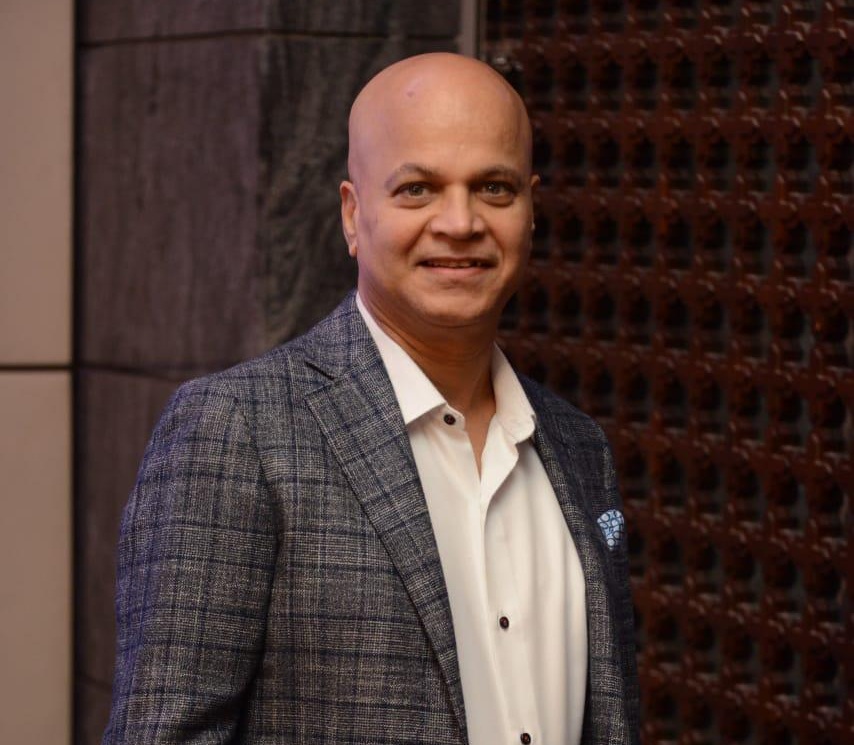 What’s more, responding to the company’s expansion plans, Koparkar revealed, that IAC Group, in addition to introducing new products, is also in talks with new-age players who have just entered Indian market (and also planning too) for supplying products.
What’s more, responding to the company’s expansion plans, Koparkar revealed, that IAC Group, in addition to introducing new products, is also in talks with new-age players who have just entered Indian market (and also planning too) for supplying products.
Currently, passenger vehicles account for roughly 90 percent of the business, with commercial vehicles forming the balance. Value-wise, Koparkar expects CV contribution to rise, even if percentage splits remain broadly similar due to the rapid growth of PV volumes.
Responding to a query on the potential growth from the CV segment, Koparkar said, “There is clear potential in CV interiors. As the CV market moves towards more comfortable cabins — with features like airbags, HVAC and infotainment — the opportunity for interior suppliers increases. Through Volvo Eicher, we have already helped drive that trend in India.”
When asked about the company’s expansion plans, Koparkar also stated that IAC Group is open to expanding to new regions as it aims to operate closer to its customers. One of the potential new projects for the company could very well be Chennai, as the company is in early talks with a new CV customer as well as VinFast.
Engineering as a Standalone Growth Lever
A key pillar of IAC India’s strategy is its expanding engineering capability. The company has been scaling up its R&D and product development team and increasingly positioning engineering services as a distinct revenue stream.
The company at present, employs over 300 engineers in India, which it aims to scale it upto 400-plus by next year and 500-plus in the coming few years.
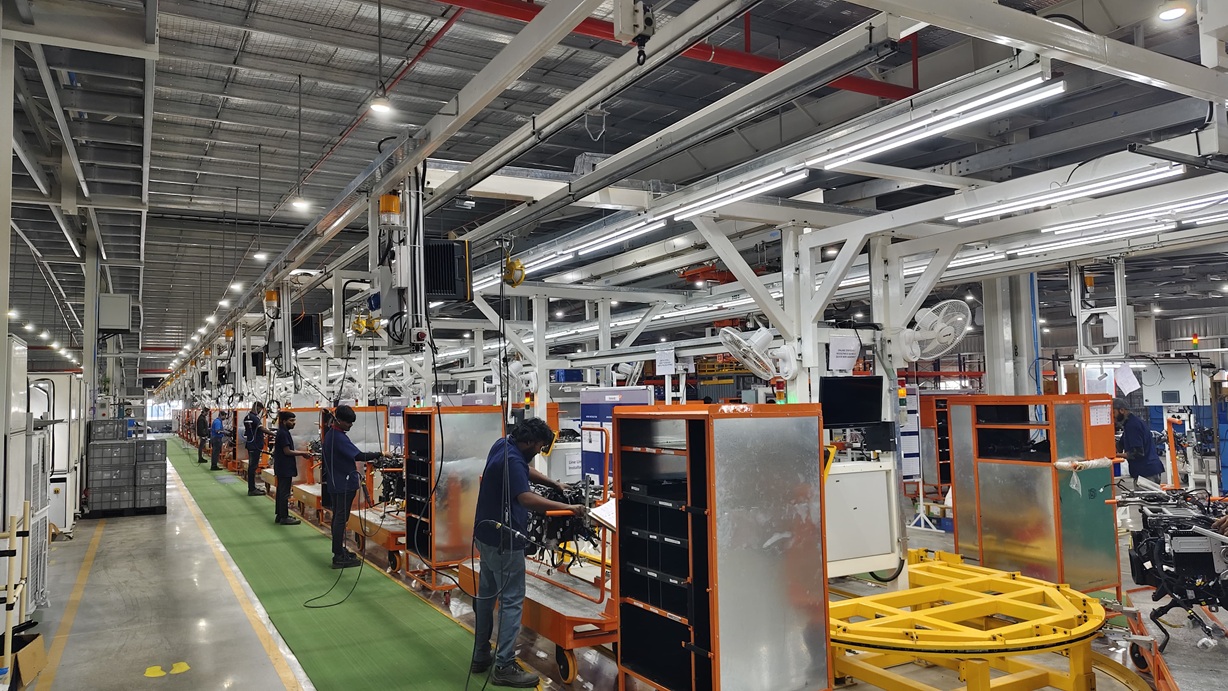
Historically, the Indian Engineering Centre supported the global IAC Group. “We were primarily the IAC Group engineering development centre. We will continue to provide those services. But now, besides global support, we are also offering engineering services to local OEMs,” Koparkar explains.
These services span studio collaboration, basic product design, CAE analysis and prototype development. In some cases, this can potentially evolve into full-scale supply programmes.
Importantly, innovation is now being formalised locally. “This year alone, we are in the process of filing about 30 patents,” he says. Earlier, intellectual property was subsumed under the global entity; now, filings are being initiated in India.
R&D investment remains aligned with group benchmarks at around 1.5–2 percent of revenue.
Exports: Measured Ambition
In terms of export potential, it currently contributes less than 5 percent towards the revenue, primarily through smaller kinematic parts. Direct exposure to the US market is negligible.
“Tariff-related uncertainty does not affect us because we do not export to the US,” Koparkar says. “Logistically, it does not make sense to ship our large interior parts there.”
Europe remains the primary export target. “The opportunity lies in leveraging our design capabilities and local development strengths. If logistics can be managed efficiently, there is room to grow.”
He also sees the Lumax Group’s aftermarket division as a future vehicle for export expansion.
Localisation and Supply Chain Resilience
On the localisation front, IAC India has made significant progress. “Last year was the first time we were able to localise over 99 percent of our tooling and development in India,” Koparkar states. Machinery on shop floors is largely localised, with only certain raw materials still imported.
The semiconductor crisis, he adds, had minimal direct impact. “We do not source electronics for our products — that is handled by the customer. However, from a development perspective, we are evaluating secondary substitutes for imported components, so we are prepared in case of disruptions.”
Premiumisation, Sustainability and AI
Premiumisation is currently the dominant interior trend. “Customers are moving away from basic plastics to more premium-feel interiors. Electronification is a big driver,” Koparkar says.
Sustainability, however, remains nascent in India. “There is no specific push for sustainable materials yet. What OEMs are looking for is lightweighting to meet upcoming CAFE norms. If a sustainable material delivers significant weight reduction, then it becomes serious.”
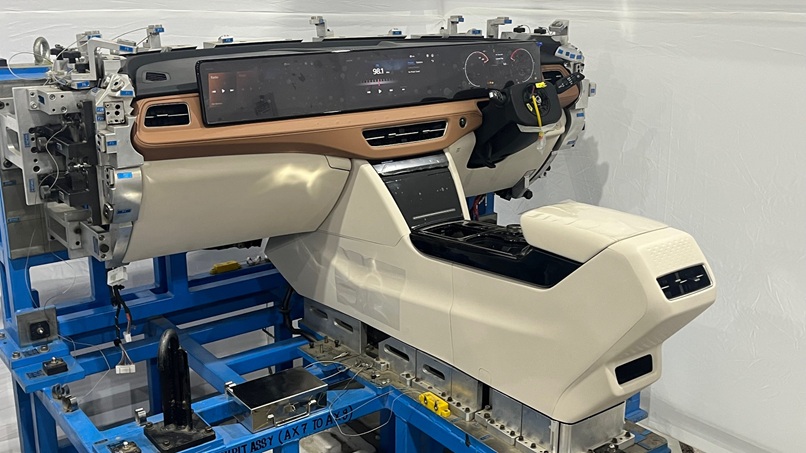
He points to jute, coir and bamboo fibres as potential alternatives but stresses that ecosystem-level collaboration is essential. “Unless a circular economy develops around us, sustainable materials will struggle to scale.”
On automation, operations across IAC’s six plants are roughly a 50:50 mix of automated and manual processes, depending on volume justification. Cobots and semi-automation are used where full automation does not offer viable returns.
AI, meanwhile, is expected to influence design more than manufacturing. “We see AI helping us accumulate design learnings and reduce design cycle times. Its impact will be more visible in engineering services than on the shop floor.”
Faster Development Cycles
Product life cycles are shrinking rapidly. “It used to take five years to develop a car,” Koparkar reflects. “With the XUV700, we worked with the customer to shrink that to 42 months. EVs are being developed even faster.”
As development timelines compress and interiors become more technology-intensive, IAC India is betting on engineering depth, localisation strength and group synergies to sustain its 20 percent growth ambition – while steadily broadening its customer and geographic footprint
- Rosmerta Technologies
- The Curious Bunch
- CII National Conclave on Road Safety
- Dr Rajesh Mohan
- Ravi Krishnamoorthi
- road safety
Rosmerta Launches Road Safety Comic Book For Schools
- By MT Bureau
- February 27, 2026
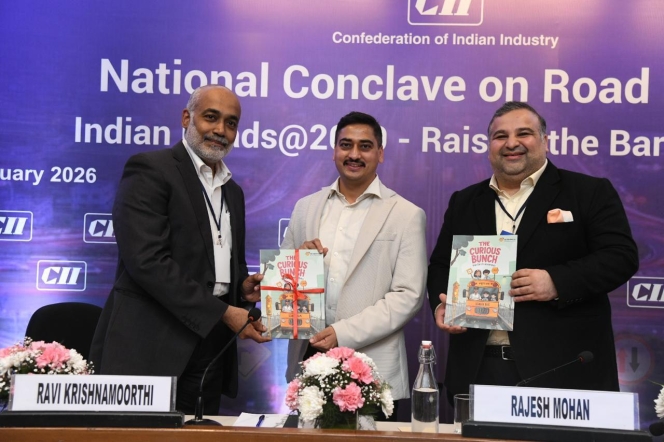
Rosmerta Technologies has launched a comic book titled ‘The Curious Bunch’ at the 3rd Edition of the CII National Conclave on Road Safety. The publication is designed to introduce road safety awareness to children.
The initiative aligns with the Government of India’s ‘4E’ strategy for road safety, which focuses on Engineering, Education, Enforcement and Emergency Care. The comic book aims to address the 168,000 road fatalities reported in India in 2022 by fostering safe habits at a school level.
The comic book uses illustrations to present road scenarios, including pedestrian conduct, school bus safety, traffic signals & the use of helmets, seatbelts and child restraint systems. By educating children, the company intends to influence the behaviour of parents and the wider community.
Rosmerta, a provider of mobility solutions, currently operates technology systems for automated driving tests and AI-based monitoring. The launch of ‘The Curious Bunch’ marks an expansion of its activities into the education pillar of the national safety framework.
Dr Rajesh Mohan, DCP, Gurugram Traffic, said, “When we educate children and instil strong moral and ethical values, the impact travels far beyond the classroom. Children naturally share what they learn. They question, they explain, and they influence conversations at home. In many ways, they become powerful advocates, encouraging their parents to be more aware, more responsible, and more engaged. Over time, this awareness translates into action, because parents are also drivers, commuters, and decision-makers on the road.”
Ravi Krishnamoorthi, Group President, Rosmerta Technologies, said, “Every road accident statistic hides a parent’s anxiety. In 2022 alone, India reported over 168,000 road accident fatalities, according to government data. Road safety is not merely about compliance; it is about compassion and collective responsibility. When a child understands why a red light matters or why a helmet can save a life, they don’t just learn a rule - they become ambassadors of safety within their families and communities. Through ‘The Curious Bunch’, we aim to nurture this awareness early, because the habits we shape in children today will define the safety culture of our nation tomorrow.”
- Maruti Suzuki India
- Transport Department of Tamil Nadu
- Automated Driving Test Tracks
- ADTT
- M K Stalin
- RTO
- CMVR
- Rahul Bharti
Maruti Suzuki Commissions Seven Automated Driving Test Tracks In Tamil Nadu
- By MT Bureau
- February 27, 2026
Maruti Suzuki India, in partnership with the Transport Department of Tamil Nadu, has announced the commissioning of seven Automated Driving Test Tracks (ADTTs) in the state. The facilities were inaugurated by the Chief Minister of Tamil Nadu, M K Stalin.
The tracks are located at Regional Transport Offices (RTOs) in Coimbatore (Central), Tiruvannamalai, Krishnagiri, Madurai (North), Sivagangai, Dindigul, and Tiruchirappalli (West). These sites form part of a Memorandum of Agreement to automate ten tracks across the state, with the remaining three at Tirunelveli, Tuticorin and Marthandam scheduled for operation shortly.
The ADTTs are designed to evaluate applicants for two-wheeler and Light Motor Vehicle (LMV) licences. The system removes human intervention from the evaluation process to ensure objective testing according to the Central Motor Vehicle Rules (CMVR).
Key technical components include:
- Video Analytics: High-definition cameras to monitor vehicle movement and path adherence.
- Sensors: Radio Frequency Identification (RFID) and Harnessing AutoMobiles for Safety (HAMS) technology.
- Identification: Face-recognition systems to verify candidate identity.
- Results: Integrated IT systems that generate test results automatically based on real-time data.
The carmaker has commissioned 56 ADTTs across eight states, including Uttar Pradesh, Delhi, and Bihar. Following the completion of agreements with Rajasthan and Andhra Pradesh, the company’s footprint is expected to reach 81 tracks nationwide.
Rahul Bharti, Senior Executive Officer, Corporate Affairs, Maruti Suzuki India, said, “As part of Maruti Suzuki’s road safety initiatives implemented across multiple states, we are partnering with the Government of Tamil Nadu to strengthen the driver licensing evaluation process through the deployment of 10 Automated Driving Test Tracks (ADTTs). Equipped with high-definition cameras and advanced analytics, these ADTTs enable a comprehensive, efficient, and transparent assessment process. It eliminates any human bias and ensures that only skilled drivers are awarded a license.”
“According to data shared by the Ministry of Road Transport & Highways, India witnessed 1.77 lakh road accident deaths in 2024. Promoting disciplined driving practices and ensuring rigorous driver evaluation are vital to prevent road accidents and augment road safety across the country,” he said.
BYD To sponsor BVRLA Annual Dinner 2026
- By MT Bureau
- February 26, 2026
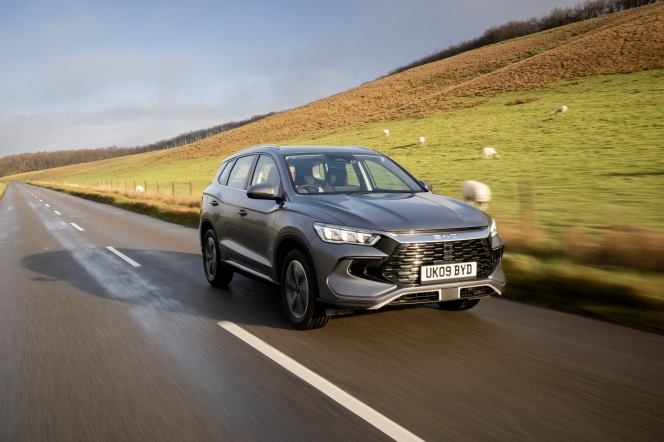
BYD, the world’s leading manufacturer of New Energy Vehicles, will once again serve as the headline sponsor for the British Vehicle Rental and Leasing Association (BVRLA) Annual Dinner in 2026. This marks the third consecutive year the company has supported the prestigious event, which is set to take place on 4 March 2026 at the JW Marriott Grosvenor House Hotel on Park Lane, London. The dinner is widely recognised as the premier gathering for professionals across the rental, fleet management and leasing sectors.
Through its ongoing sponsorship since 2024, BYD reaffirms its commitment to this vital segment of the UK automotive market. The company’s expanding presence was underscored in 2025 by the introduction of several new models, including the SEALION 7, DOLPHIN SURF, SEAL 6 Saloon and Touring and the ATTO 2. These launches contributed to significant sales figures, with 21,824 units delivered to fleet customers and 5,964 to the rental sector. The momentum has continued into 2026 with the debut of the SEALION 5 DM-i, while the ATTO 2 DM-i and ATTO 3 EVO are expected to arrive shortly. Supporting this growth is a dedicated UK fleet team of 11 specialists, offering tailored product and service expertise.
The BVRLA represents around 1,000 member organisations, ranging from SMEs to large public companies, all operating within or alongside the UK’s vehicle rental and leasing industries. By engaging with government and upholding professional standards, the association enables its members to provide safe, sustainable and accessible transport solutions. This year’s Annual Dinner will feature the presentation of the Industry Hero Awards and live entertainment from award-winning comedian Tom Ward, celebrating excellence across the sector.






Comments (0)
ADD COMMENT